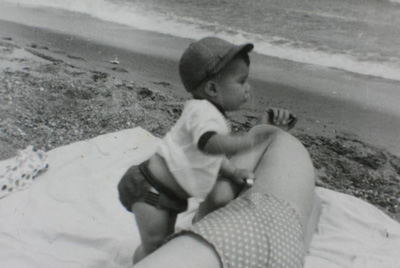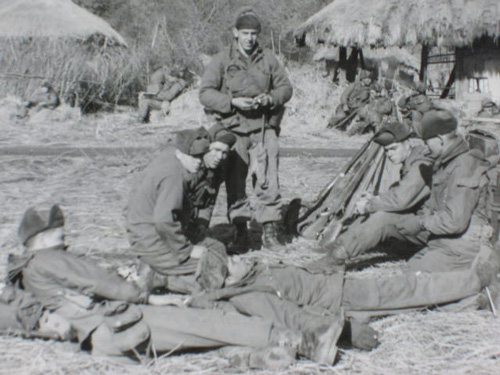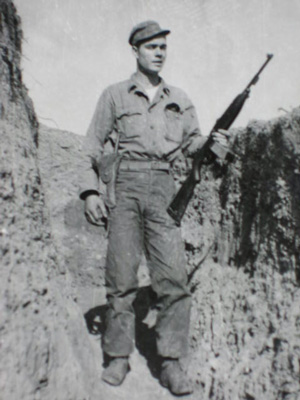May 31, 2005
In Memory Of

One time my father told me that he felt that the Korean War was a mistake, that it was not worth it. He was one of the first troops inserted into the Pusan Perimeter to stem the Communist advance across the whole peninsula. It is an immense story, one that I think is neglected. And there is no way that I can do the telling of it any justice in this brief blogpost. It deserves more than that.
(Prepare -if you will- for short, brutal strokes:)
It was five years after the second war after the war to end all wars. America's military was unprepared, neglected... people didn't want to think about war any more. As a result, young and inexperienced troops were thrown into hell with little equipment or preparation. My dad had just turned eighteen years old.
My father survived, and for the fifty years after his unit was wiped out, he built a wall against it in his mind. He rarely spoke of his time there as I was growing up and when he did it was clipped. Fifty years later, the wall fell apart and he succumbed to PTSD... he went mad. Uncontrollable flashbacks. Shock therapy, medication. The medical benefits were insufficient, a symptom of national neglect. Unable to maintain the distinction between reality and imagination (the war), he finally took his own life almost fifty years to the day when his unit was surrounded by the North Korean army and wiped out. He was among a hand full that managed to escape in a melee of hand to hand, eye to eye desperate man killing battle.
I write this remembering that our society (my experience in the USA at least) has for generations satirized a stereotype of the crazed veteran. Hollywood has amused millions and made money off of the cartoon image of the mentally destroyed, pathetic ex-soldier.
What a shame.
What a shame.
Here, a small peep from whatever fragments the Army's historical record can provide:
Page 224 SOUTH TO THE NAKTONG, NORTH TO THE YALUMy father's brief account portrays the eighteen men who forded the river as the only survivors. They made their way back through hostile country, escape and evasion.Meanwhile at Anui, Lieutenant Hughes' B Company, 28th Infantry, was under attack from superior numbers closing in from three sides, and by nightfall it had been forced back into the town. Hughes made plans to withdraw across the upper Nam River to a high hill east of the town. Two officers and sixteen men got across before enemy automatic fire cut off the rest. After vainly trying to help the rest of the company to break out eastward, the eighteen men went over the hills to the 34th Infantry position at Koch'ang. In Anui the cutoff troops engaged in street fighting until midnight. Those who escaped walked out through the hills during the next several days. Approximately half of the 215 men of B and D Companies, 29th Infantry, taking part in the Anui battle, were either killed or listed as missing in action.

My dad is the second one from the right, sitting.
Colonel Wilson and the rest of the battalion at Umyong-ni meanwhile knew nothing of the fate of B Company at Anui except that enemy forces had engaged it, and that roadblocks were above and below it. Wilson made two unsuccessful attempts to send help to B Company.

The enemy troops that had closed on Anui were advanced units of the N.K. 4th Division. They were well aware that a mixed force of American and South Korean troops was only a few miles below them. To deal with this force, elements of the division turned south from Anui early on 28 July.

In defensive positions about Umyong-ni and Hamyang, Colonel Wilson's men were on the east side of the Nam River. Col. Min Ki Sik's remnants of the ROK 7th Division and a small force of South Korean marines were on the west side. American mortar fire turned back the small enemy force that approached Umyong-ni. On the west side of the river near Hamyang a hard fight developed. There, the South Koreans seemed about to lose the battle until their reserve marines fought through to the enemy's flank. This caused the North Koreans to withdraw northward. From prisoners captured in this battle Wilson learned of the American defeat at Anui the day before. [43]
When he expressed his feeling that the war wasn't worth it, I told him that he was wrong. I described the huge Korean American community in Los Anglees, how happy and healthy they are. I reminded him of the success of South Korea, that for generations Korean families have grown in freedom, happy and secure. Generations. They enjoyed this because of his sacrifice in that war.
But I understood his feeling, partly. He was speaking personally. I believe he was a casualty of the Korean Conflict. I believe that death put it's hand on his shoulder, and he lived with death for all those fifty years. I will never forget the early mornings when my dad would be the first to awake, smoking his cigarettes in the darkness of the dining room, coffee brewing, alone with thoughts no one could share. There is a character in the TV series "Band of Brothers" who at the end pleads with G-d to let him survive and live so that he can enjoy a simple life. I think this is what my dad did.
He eschewed the ever increasing complexities of modern life to the point of retreat. He would say that he felt he was born in the wrong century and over time it was hard not to thinkof him as a hermit. He said that he wanted to live as rich a life as his military pension would give him. His favorite story was taking off on the highway with his van, fishing tackle and a sleeping bag, a bag of groceries. A rest stop by the highway and a ice cold babbling brook and by sunset, a bunch of fish on a grill to be shared by fellow travellers, vagabonds. I thought of him as an contemporary Indian, Native American (there's Choctaw in the family tree).
It sounds noble but I also think that this was a turn toward death. I remember when he retired from the Air Force. He was 36 years old. He bounced from job to job, eventually settling on being unsettled, reaching for as rich as life as one could have on a military pension. He loved nature and he achieved his goal, but he also retreated from life. He retreated from the challenge of remaking himself, of forming a second act. It was almost as if the events of 1950-51 seared away and exhausted his capacity to struggle. And how can there be a life without struggle?
I can only only touch a few aspects here. I apologise for the rough hewn treatment in this blogpost... I apologise to you, Papa.
My father's story is a huge one (as is my mother's side of the family), one I hope to tell more fully in the coming years.
I listened intently as he talked about the future. Although I had only known him for a few short hours, it was clear that Mr. Qatou liked to talk about the future.Posted by Dennis at May 31, 2005 11:09 AM
"My life is nearly finished," he said, almost wistfully. "But will be good for my children and my children's children."
"Yes," I said. "It was worth it, no?"
"What?" he asked, confused at my meaning.
"Your struggle," I said. "Now you are free."
Mr. Qatou smiled and disappeared into his memories briefly, then he spoke:
"My life was mostly soldier and prisoner. My children are free."
Leave a comment